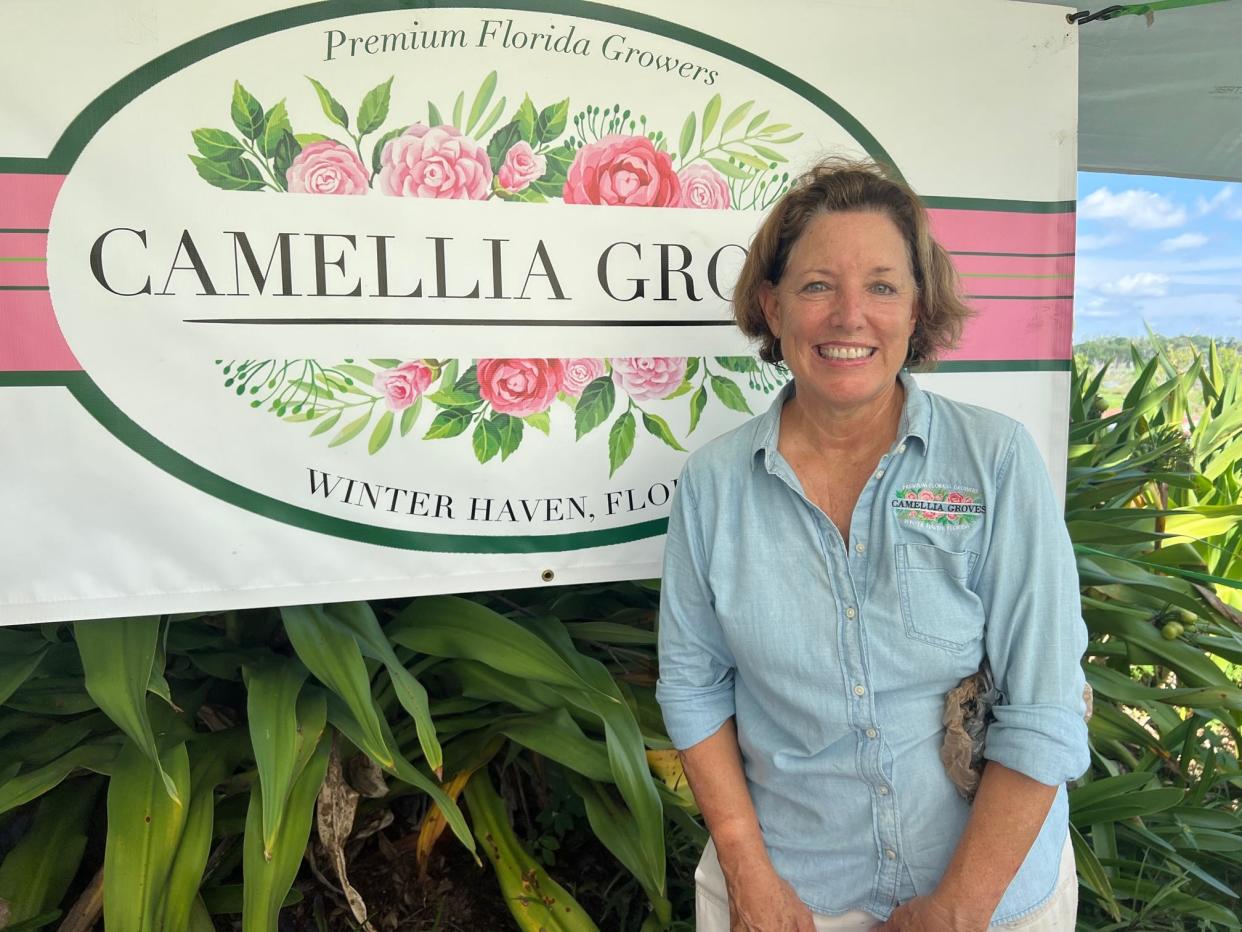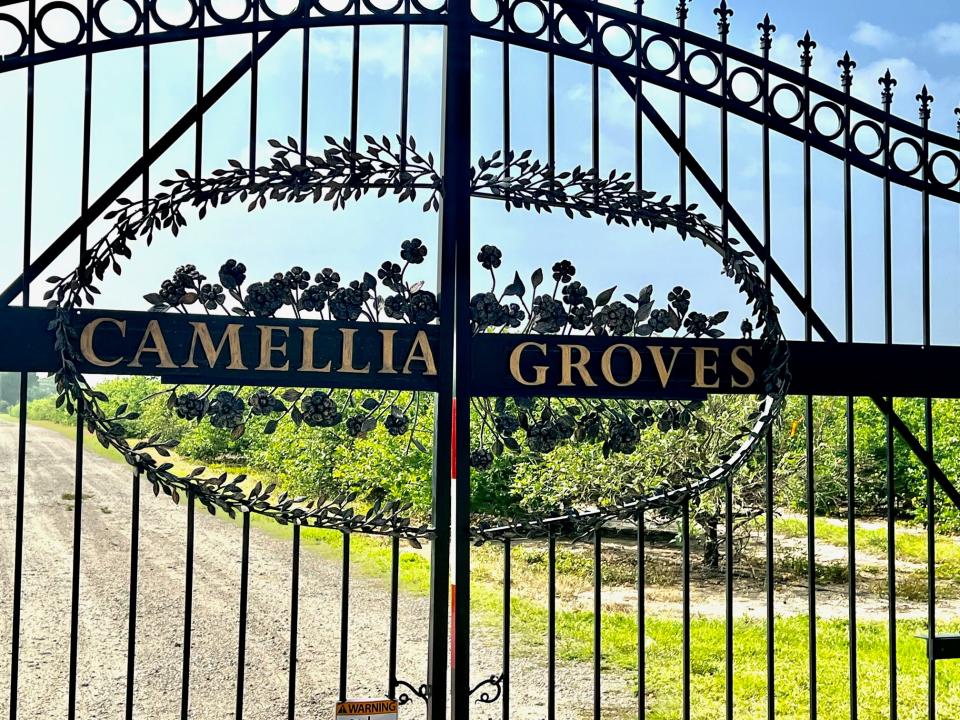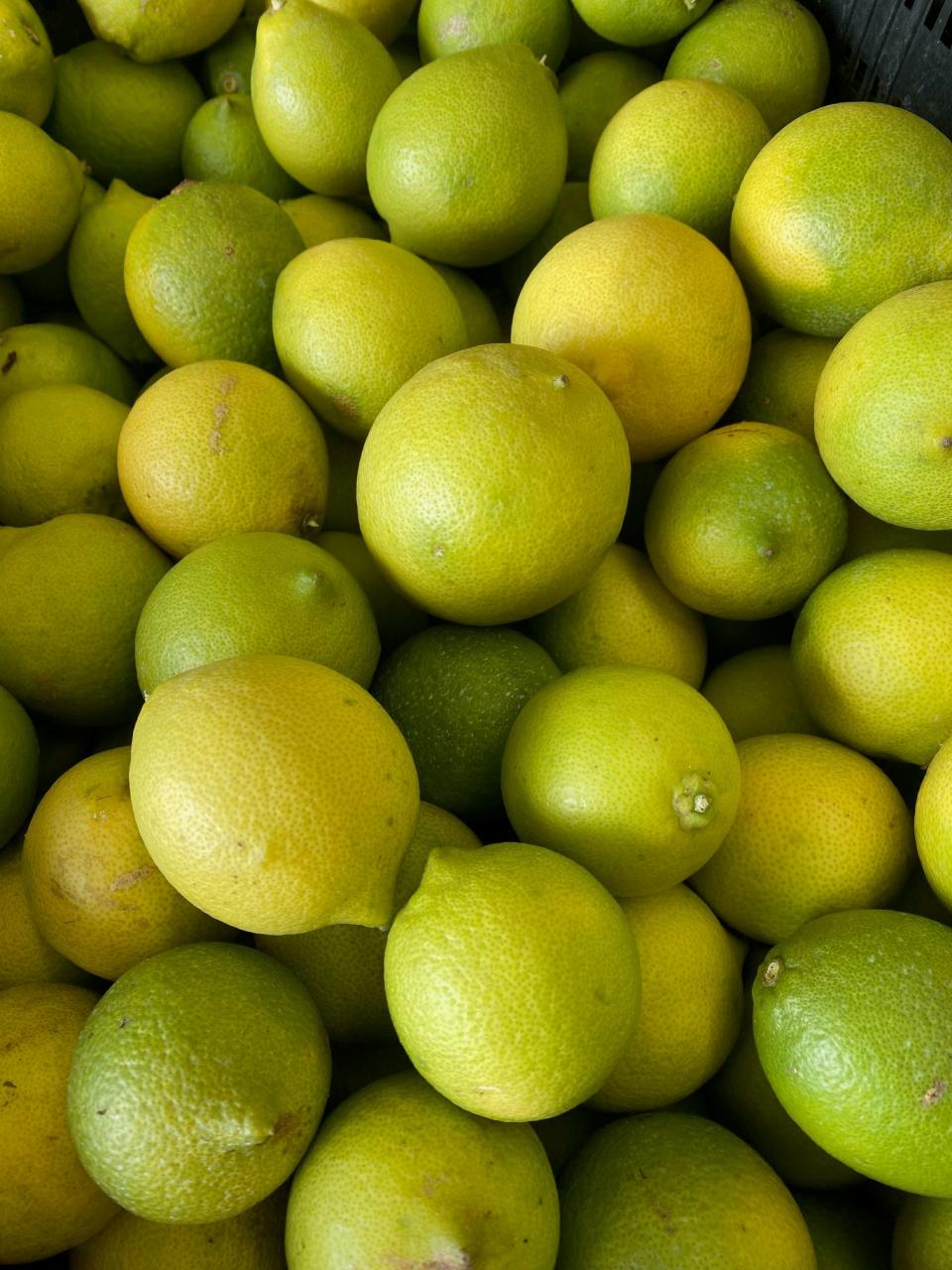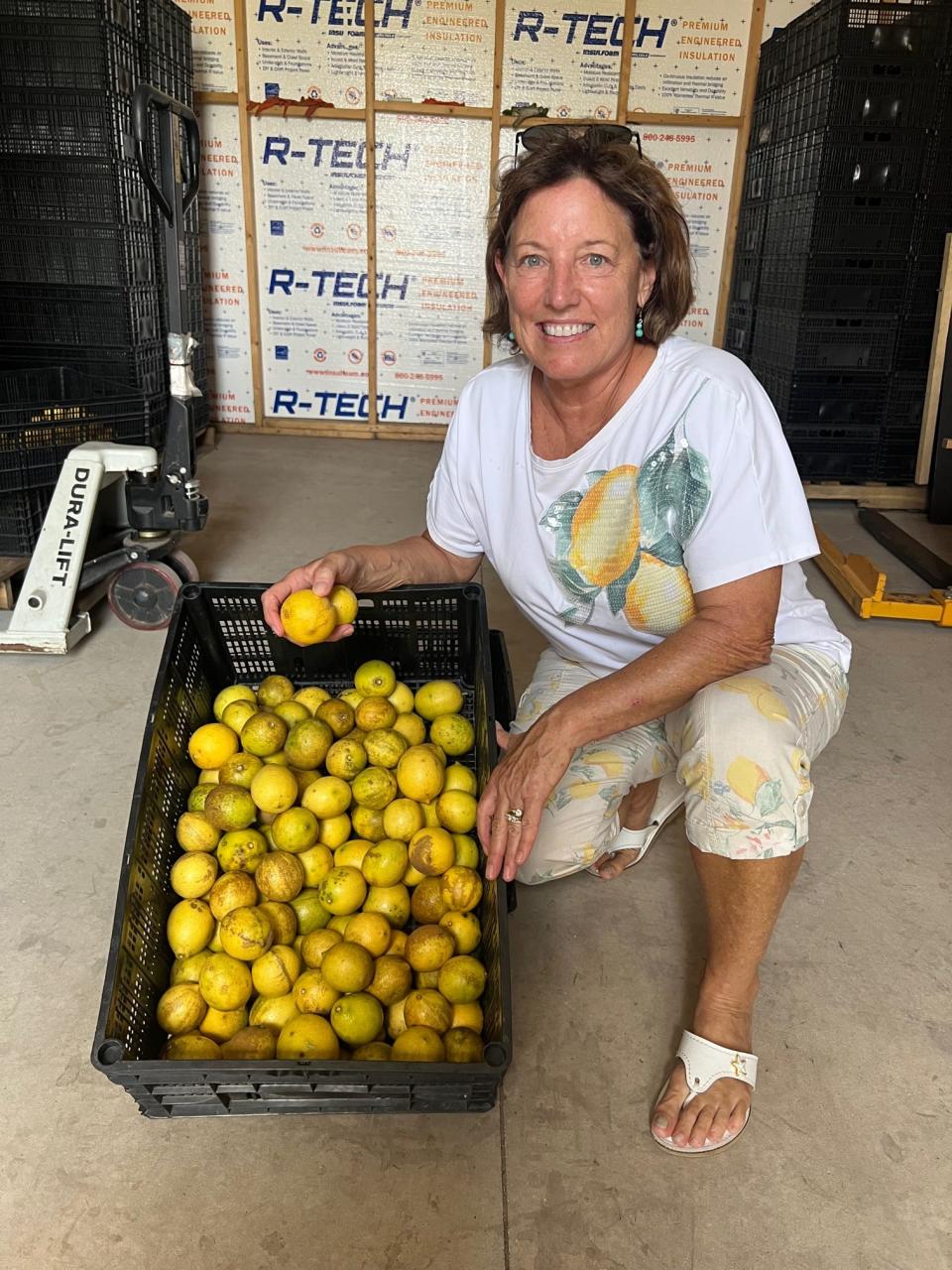'It's keeping us young': Winter Haven grove finds niche selling organic lemons

Lemons were grown as far away in time and place as first century Persia, and as close in time and place as right now in Winter Haven.
For Martha Roe Burke, growing this ancient fruit has come full circle. Raised in a house surrounded by groves, as a young adult she spent a couple of years in that foreign land known as Miami before returning to Winter Haven, where she was born seven decades ago this month to prominent citrus growers. She worked in the family company for a time, served on the Citrus Commission for six years and then left the business to pursue another profession.
When she and her husband, Joe, retired six years ago, they hit upon the idea of growing specialty fruit on their property – acreage where orange trees once bloomed but which had since withered with greening, that virulent disease that has decimated Florida’s once-dominant citrus industry.
Energetic and effervescent, Roe named their operation Camellia Groves, 32 acres that border State Road 540 and overlook Eagle Lake.
Q. What was your initial experience in the citrus industry and where did you go afterward?
A. I was very active with the family business for many years running my tissue culture lab, which cloned plants and did disease elimination for hybridizers all over the world. When I left the business, I asked myself, what am I good at? I came to realize that marketing and seeing things futuristically – for example, as one of the developers of tangerine varieties that Roe & Co. had devised – was a real joy.
How do I apply that? About that time, Joe Tedder contacted me and said he needed someone to fulfill a public information officer role and be part of the compliance and accountability program and thought I’d be great at it.
Q. And how did you get back in it?
A. So, 15 years later I retired from the tax collector’s office – about the same time a grove we had was dying from citrus greening. We messed around with peaches for a while but that was a non-starter.
Q. Why?
A. Peaches are a lovely fruit, but getting them to market is very painstaking and requires special expertise that simply didn’t exist here. People treated them like oranges – but they can’t be treated that way. So we had terrible returns. And then the one year when the peach crop up in Georgia froze – that was supposed to be a great year here – all we did was break even, and that was that.

Q. Given your background, it would have been logical to go back to growing oranges.
A. We started doing research and discovered that lemons are more resistant to greening than other citrus varieties. They have a root system that tends to regrow itself every year and of course the problem with greening is that it basically starves the tree from the roots. Gilbert Bowen, another grower, told us that while a lot of juice lemons were being grown in South Florida, nobody was growing fresh lemons. You could buy them from California but the fruit is very different – California fruit is grown in an arid environment where the skin is very thick and the juice content is very low. In Florida they’re all about the juice – there’s 40% more juice in a Florida lemon than a California lemon, volume for volume.
'You have to care' Family experience led Mark Arquitt into the home-health care business
Q. So you jumped in?
A. We learned that Harvey lemons are naturally seedless. “Seedless” in the citrus industry means there are three seeds per fruit on average. Even California lemons have seeds. But lemons weren’t being grown this far north – they’re very cold sensitive. And we know what the freezes of the late 80s and 90s did to citrus here. But with global warming, things have changed. We really haven’t had a devastating freeze in quite a long time. We’ve had more problems with hurricanes.
So we jumped in with both feet and planted all our acreage in lemons – now 32 acres. We weren’t really sure how we were going to market it, so I messed around online and found a website called Local Harvest – a repository for organic farms nationwide. Lo and behold, we had a representative from an outfit in Canada contact us. She hopped on a plane, looked at our operation and said, “We will buy every lemon you can produce if you will grow them as close to organic as possible.”
Q. In the context of citrus production, what constitutes organic?
A. “Citrus” and “organic” should not be used in the same sentence. Citrus is a very heavy feeder and no amount of natural manure could ever feed them sufficiently. Layer on top of that citrus greening – in which the most successful growers today are using a fertilizer formulation that is very high in magnesium to overcome all the deficiencies that citrus greening is causing. We have a certification that is called “synthetic pesticide free.” I don’t think anyone with a producing grove has an organic citrus certification – I don’t think that grove exists.

Q. How important is the word organic to your buyers?
A. We believe that what a customer wants to hear is that there’s nothing that’s been sprayed on the peel or the fruit that is synthetic. We will apply sulfur and copper – elemental formulations found in nature – coating the leaves to prevent canker and spider mites. We also apply herbicide to the ground, which is allowed because it’s not going on the tree. And if we can grow our fruit as organically as possible our costs are much, much less.
Q. Do you ship all your fruit north?
A. At first I put a website out there to mess around with single fulfillment and all of a sudden I’m bombarded with people wanting to buy, and I’m thinking, I’m not Harry and David, I can’t do this and the margin is so minimal. But we hated to send all our fruit to Canada. We wanted to find a way to sell them locally as well without putting out a shingle and that’s where our Local Harvest events started happening. We started this about three years ago and the next thing you know we have over 1,200 followers. When we have a surplus of fruit we put the word out and invite other neighbors who have mangos and lychees and starfruit to join us.
Q. Orange trees in the old days were as high as 30 feet – hard to pick. How high does a mature lemon tree grow and how long before they produce?
A. Many years ago we threw away all the ladders – our insurance companies advised us to do so. You won’t see many ladders in citrus trees anymore. Citrus trees are grown now in hedgerows to be picked from the ground. Our trees were planted in 2017 and we had harvests the second year. Lemons are very vigorous. And they bloom multiple times through the year. As a retired couple, that’s the last thing you want to hear, that you can harvest all year long. But our customer wants to get lemons all year.
We’re harvesting every two weeks throughout the year, which is crazy, and harvest according to size. Right now we have a lot of small fruit out there which never sized because the hurricane last fall took a lot of leaf canopy away and with it the carbohydrates, so the trees haven’t sized as they normally would. Then we had the drought this spring.

Q. Do you irrigate?
A. We irrigate but we learned that with lemon trees, because of citrus greening and the clogging up of all the root system, you can put gallons and gallons of water out there and the tree will still be in a drought. So you’re doomed unless you can get more water up into the canopy. We discovered that this spring and we’re in the process of elevating the microjets four feet up into the tree so we’ll be irrigating the leaves – the leaves offer a better uptake of water. If you put the same amount of water on the ground versus overhead, the difference is absolutely remarkable.
Q. What level of production have you achieved and how do you package it?
A. Our unit of measure is a bin of 850 pounds and that’s how our customer buys it. We ship right out of our little low-tech barn. We do a light grading for blemish but they don’t get washed, they don’t get waxed, they go into the bin, the bin goes onto a pallet and we forklift that to cold storage and it ships out the next day. I would say we’re close to 200,000 pounds per year. We have about 2,500 trees – It’s not that much but for a little mom-and-pop operation it’s kind of fun. My father would roll over in his grave if I told him I was making money off of 25 or 30 acres of citrus – he wouldn’t believe it. It’s unheard of, but we’ve found this cute little niche and it’s keeping us young.
'Change people's lives' Bartow Police Chief Andy Ray talks about fixing the department
Q. Shortly after you started this operation, Covid arrived. How did you fare?
A. During Covid the world shuts down. All the lemon sales going into restaurants to put in their water all goes away, People are dumping lemons in Argentina, in Chile, in California. Us? We’re shipping full blast because our primary customer has a subscription service – direct to the consumer, keep it in my basket every week until I tell you otherwise, so it was just another one of those serendipitous things – we sailed through covid without any problem, selling everything we could produce.
Q. These subscription customers of your primary buyer, they’re Canadian I gather?
A. Yes, and the customer in Canada is very sophisticated – they eat with their brains, not with their eyes. Our fruit is not perfect but the point is they don’t want it washed, they don’t want it waxed, they want it fresh out of tree with nothing done to it artificially. So what if there’s a little scab or scratch on it? They know that what’s on the inside is what matters.
Q. Who picks your lemons and where do you find them?
A. That’s one of the most challenging aspects of what we do. We have a young Hispanic family and they have friends. I don’t know why growers all over the state aren’t up in arms about curtailing immigration. Who do you think picks crops in this country?

Q. Aside from the obvious, what are the rewards that drive you?
A. I like what I’m doing. I’m getting back that connection with nature. And our local harvest events – I feel like we’re building community, and in this day and time we need to be doing more of that kind of thing. It’s not about the money, it’s about the celebration of life, being together with people in this beautiful place that will only be here for a blink of an eye to share.
This article originally appeared on The Ledger: Camellia Groves in Winter Haven sells organic lemons by subscription

